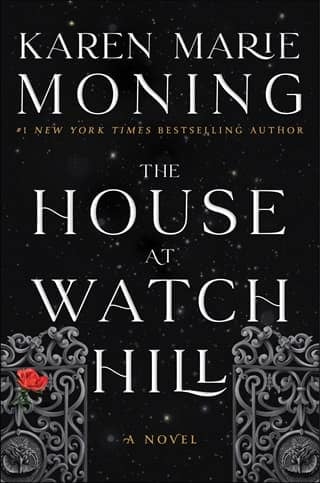18 Alisdair
18 Alisdair
It began in innocence, as do many of the world's great atrocities.
I should know, I was witness to countless acts of evil, and often the perpetrator of them before I was condemned to this hell,
forced to be eternally near, yet eternally separated from Rhiannon, who endures her own hell at our enemy's hand.
But I digress.
Zo Grey's story is still unfolding; there is an older one that must be told. I may be condemned to eternity, but my enemy
has no such immortality, only cheats death again and again. One day, somehow, I will stop this. I will prevail.
It is a tale that begins centuries in the past.
The child had no idea what she was.
Nor did those who raised her.
Abandoned, of unknown lineage, the child's world was a dirt-floored, thatch-roofed hut with a single room, two sleeping lofts,
and the ever-changing wonders of fields and brooks her da toiled in, in exchange for the protection of their feudal laird.
Much debate would one day be raised about whence she came—by which time she was already infamous—but the humble peasants who'd ached endlessly for children of their own, only to prove barren as the most miserly of drought-parched fields, suffered no such concerns. It was a blessing the bairn was found upon their doorstep on a dark and stormy night, one so calamitous they'd not have heard her squalls but for a momentary lull, during which a single heartbreaking cry pieced the night.
Whisking the wee soaked babe into heart and home, the pair questioned none of it. (Excepting once in hushed whispers that
she might well be their laird's unwanted by-blow.) Not the finery in which she came swaddled, nor even the fat pouch of gold
that would have changed their fortunes forever, had they not tucked it carefully behind a stone in the corner of their hut,
up high, near the roof rafters. The love of a child could not be bought and paid for, only gifted, as the wee one had been
gifted to them.
One day, they vowed, the gold would be hers, ensuring her a fine husband and life of ease. But until that day, she would learn
the unvarnished, ofttimes harsh truths of the seasons and the soil, the value of filling a larder, the warmth of love uncorrupted
by foolishness and frippery.
It began in innocence and with good intentions, as a great many evils do.
The child was seven, a young lass of incomparable loveliness and amiable demeanor, when her mother fell from the roof, which
she'd been repairing whilst her husband was traveling to pay their annual tithe. Her mama landed badly, and the angle at which
her neck was turned upon the flagstone, the pool of scarlet haloing her head, filled the child with terror that death was
near.
As she knelt, wailing with grief, watching her mama's face pale to snow, eyes glazing, Death, indeed, appeared; the great
Arawn, Celtic god of the Otherworld, long cloak flapping, as if arriving upon a wild storm.
Screaming, the child flung herself at the dark man, demanding he not take her, in a voice that brooked no resistance, a voice none had taught her, a voice that sprang from blood and bone.
Death demanded, Are you certain you wish this?
Yes , the child shouted. Leave her alone! Restore her to me!
There is a price, Death said.
I don't care! the child screamed.
Death smiled. One day you will.
With that, the dark man was gone.
When her mama pushed up from the stone, looking shocked and confused, sporting naught but a small abrasion of scalp, the child
flung herself into her arms, and they clung together, sobbing with relief.
Upon learning, the next day, that the village midwife had stumbled over a broom, striking her head upon the corner of the
hand-hewn table her husband had gifted her upon their wedding day, snapping her neck, mother and daughter did what villagers
do and took freshly baked loaves of bread and a leg of glazed mutton to the grieving widower. They murmured fervent thanks
as they journeyed home, for their own good fortunes, and gave it no further thought.
As her mama was forever chiding her abundance of imagination—fairies did not frolic in the babbling brook, gossiping of near
and distant human deeds, nor did birds sing the sorrows or joys of the seasons to come (despite their daughter's predictions
being uncannily accurate)—the child decided, muddled by panic and mindless fear, that she'd only imagined the dark man.
Until the night he came again.
 Fullepub
Fullepub 



